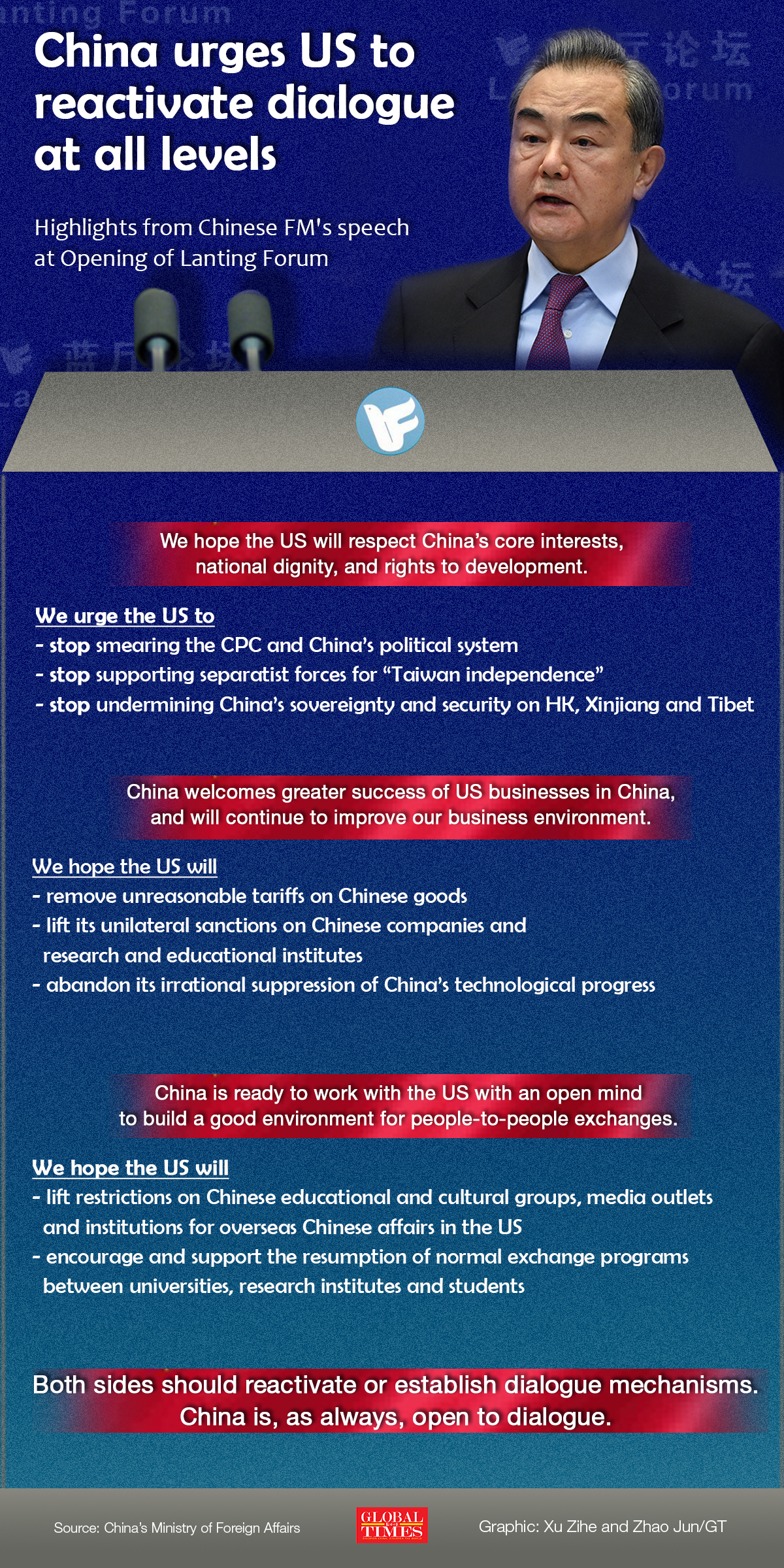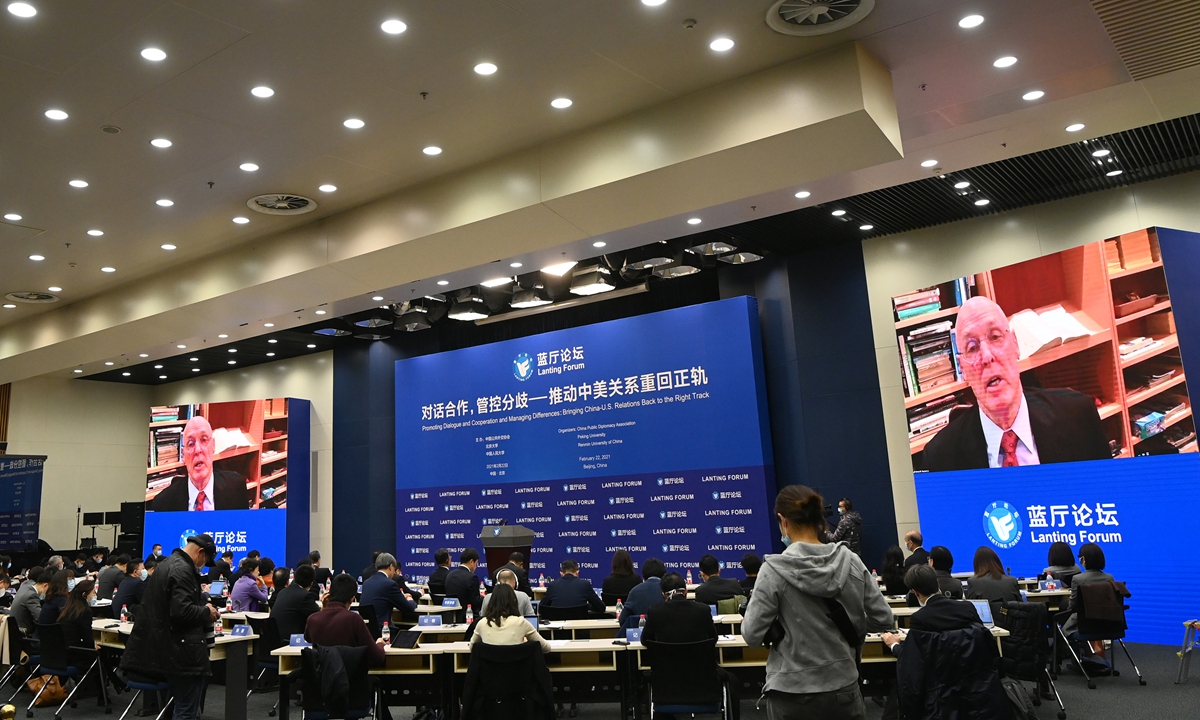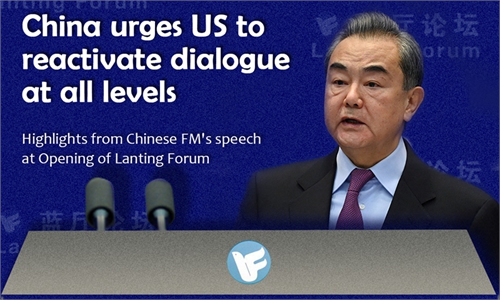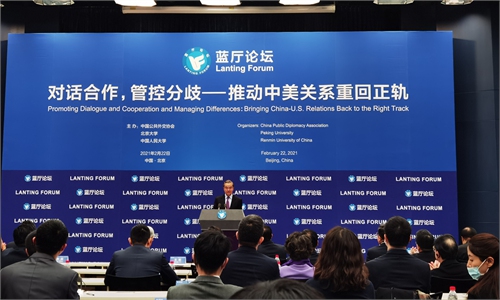China sends US further message, urges repair of ties
No winner from ‘strategic competition’, ex-official warns

Graphic: Xu Zihe and Zhao Jun/GT
China has once again sent a clear and concrete message to the US, calling for bringing bilateral ties to the right track after US President Joe Biden failed to agree with allies at the G7 summit and Munich Security Conference on confronting China together, as State Councilor and Foreign Minister Wang Yi, at a forum held in Beijing on Monday, urged the new US administration to adjust its problematic policies on China "as soon as possible."
"Over the past few years, the US cut off bilateral dialogue at all levels. And this was one of the main reasons for the deterioration in China-US relations," Wang said in his address at the opening of the Lanting Forum on Promoting Dialogue and Cooperation and Managing Differences: Bringing China-US Relations Back to the Right Track.
To right the wrongs and bring China-US relations back to the right track, the walls of misperceptions must be torn down first to clear the way for knowing, learning and understanding China, Wang said.
Wang said, "We know that the new US administration is reviewing and assessing its foreign policy. We hope US policymakers will keep pace with the time, see clearly the trend of the world, abandon biases, give up unwarranted suspicions, and move to bring the China policy back to reason to ensure a healthy and steady development of China-US relations."
Chinese experts and former diplomats who participated in the forum said the Biden administration might still need time to review US policy toward China, so it would be difficult for the US to respond to China's requests immediately. But time is flying fast, action is much more crucial than words, and China is not over-charging the US, in terms of policy demands. The requirements for fixing ties are reasonable.
Henry Paulson, former Treasury secretary, spoke via video link at the forum's opening ceremony after Wang's remarks. "I'm pleased that Joe Biden is now president…This will result in more predictable policies and less inflammatory rhetoric," he said.

Henry Paulson, former US treasury secretary, speaks via video link at the forum's opening ceremony. Photo: cnsphoto
"But structural dynamics of power will ensure that US-China relations are fraught for the foreseeable future." China and the US need "to minimize the likelihood of debilitating conflict and to make progress on areas of mutual interest. The US and China must decide how and where to compete and how to avoid conflict. If we don't, the world will be a very dangerous place," Paulson noted.
"Our two nations will face increasing pressures to decouple, driven primarily by national security concerns…there are problems that we simply cannot mitigate and solve without at least some coordination, if not cooperation," he said.
Paulson also said that "From now on, this relationship is going to be competitive in every domain - technological, economic, financial, military, and ideological," and "The US and China are going to be locked in strategic competition for a long time."
Fu Ying, former Chinese vice foreign minister and the vice-chairperson of the Foreign Affairs Committee of China's National People's Congress indirectly responded to Paulson's opinion at the forum. She said at a panel discussion that China and the US should not have "strategic competition" because this kind of antagonistic major power competition had occurred in history many times, and some of them caused war.
China and the US should not repeat such a wrong path that would lead to lose-lose consequences, Fu said, noting that China is not afraid of competition, but the competition should not be "strategic," and it needs to be healthy and virtuous.
The forum held by the China Public Diplomacy Association, Peking University and Renmin University of China has three sub-forums for panel discussions. The topics are: rebuilding political trust, restoring balance to economic and trade ties, and resuming people-to-people exchanges.
Aside from former diplomats and scholars, some notable figures from various fields also joined the discussions, including Yao Ming, former Chinese NBA superstar and President of the Chinese Basketball Association; Lang Ping, head coach of the Chinese Women's National Volleyball Team and former coach of US women's national volleyball team; Zhang Wenhong, China's leading infectious disease expert and head of the Shanghai COVID-19 medical team; and Cao Dewang, chairman of Fuyao Group.
China's demands
The Chinese State Councilor said the two countries should respect each other and not interfere in each other's internal affairs, as he drew "the red lines" that can't be crossed.
"We urge the United States to stop smearing the Communist Party of China and China's political system, stop conniving with or even supporting the erroneous words and actions of separatist forces for 'Taiwan independence,' and stop undermining China's sovereignty and security on internal affairs concerning Hong Kong, Xinjiang and Tibet," Wang said.
Wang said, "We hope that the US will adjust its policies as soon as possible, among others, remove unreasonable tariffs on Chinese goods, lift its unilateral sanctions on Chinese companies and research and educational institutes, and abandon the irrational suppression of China's technological progress, so as to create necessary conditions for China-US cooperation."
He said to bring China-US relations back to the right back, it is important to clear the path for the resumption of bilateral exchanges in all areas, and China is ready to work with the US with an open mind to build a good environment for people-to-people exchanges.
China hopes the US lifts restrictions on Chinese educational and cultural groups, media outlets and institutions for overseas Chinese affairs in the US, remove its obstructions for the US local governments and social sectors to engage with China, Wang said.
"COVID-19, climate change and world economic recovery are the three most pressing tasks for the international community. As a major responsible country, China is ready to coordinate policies and work with the United States in these three areas for the good of the world," said the Chinese Foreign Minister.
Patience and actions
Wang Jisi, president of the Institute of International and Strategic Studies of Peking University, who attended the forum on Monday, told the Global Times that China has raised very clear and concrete demands, and the US is also reviewing and considering adjustments on specific issues, such as tariffs.
"But we need to be patient" since the Biden administration needs time to take an "inter-agency review" to coordinate the actions of its Department of Treasury, Department of Commerce and so on, to issue an overall China policy, Wang Jisi said.
"This would at least take half a year. We hope the US can respond as soon as possible, but Biden is also facing domestic pressure. If he makes adjustments immediately after China sends the requests, he would face domestic criticism of being too soft on China," Wang Jisi noted.
Ruan Zongze, executive vice president of the China Institute of International Studies, who also attended the forum, told the Global Times that "China is not over-charging the US" since those requirements listed by Foreign Minister Wang are reasonable, which aim to bring the ties back to normal.
"Of course we need patience, but time is flying fast. The two countries, especially the US, need to take action as soon as possible. Any action in the fields like people-to-people exchanges, media as well as economy and trade would be much more useful than words," Ruan said.
"We don't need to mind too much about who will take action first, as it would be regarded as a compromise, so China and the US can take actions together," Ruan noted.
Diao Daming, an expert on US studies at the Renmin University of China who also attended the forum, told the Global Times that the Biden administration is making some moves to fix bilateral ties.
The moves include pausing the Trump administration's bans on Chinese social media APPs WeChat and Tik Tok; withdrawing a rule proposed during the Trump administration that would require US universities to disclose their financial ties to Confucius Institutes, organizations set up to teach the Chinese language and culture in American schools; and holding a dialogue between Chinese and US chief epidemiologists on fighting COVID-19.
"But we need to see more sustainable changes that can provide a clear direction to speed up the recovery of China-US ties," Diao said.
The Chinese State Councilor said that the two sides should engage in candid dialogues on a broad range of issues in bilateral relations, and on major regional and international issues, to understand each other's policy intentions, sort out the critical issues in China-US relations, explore effective ways to manage sensitive issues, and ward off risks and remove obstacles.
"China is, as always, open to dialogue. We stand ready to have candid communication with the US, and engage in dialogue aimed at solving problems," Wang Yi said.




